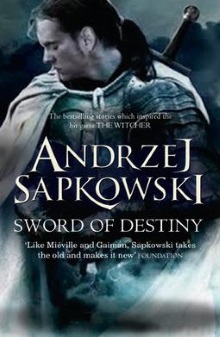
These days I buy pretty much all of my book on Google Books but for whatever reason this one didn’t seem to be available so I had to order a physical copy. I suppose that at some point I should start buying Amazon Kindle editions as they seem to have a much larger selection. This is another collection of short stories that chronologically follows The Last Wish. However while it was originally published in Poland in 1992 it was only translated to English in 2015, probably due to the overwhelming popularity of the video game.
As with the previous volume, this book consists of six stories though this time there isn’t a frame story linking them together. Whereas the first book was about introducing the world and the recurrent cast of the series, this one has a strong focus on Geralt’s relationship with Yennefer and then Ciri. One story does however introduce the character of Dudu who has a prominent role in The Witcher 3. As you can guess from the title of this collection, the recurrent theme here is that of destiny. Geralt’s destiny is tied to Yennefer due to the genie’s wish and also to Ciri due to his invoking of the Law of Surprise. Yet the characters constantly mutter that destiny alone is not enough and something more is needed. This appears to mean that while destiny ensures that the characters constantly run into one another when least expected, they still have the choice of whether or not to give in to it. In the case of Ciri, Geralt initially refuses to have anything to do with her, much to the delight of Ciri’s grandmother Calanthe who was worried that he would steal her away. However as everyone already knows, destiny has a way of making people regret opposing it.
As befits the theme of a Geralt more preoccupied with his inner demons, these stories are noticeably less action-packed than the previous ones and there is more than one occasion on which he is completely outmatched. I have to confess that the way Geralt and Yennefer constantly repeat their cycle of being together, fighting and then spending years apart only to find each other again to be rather irritating. But I have to concede that it is realistic, especially given the long lifespans of sorceresses and witchers, and I gained an appreciation of just how closely they are linked together in a way that the games don’t fully capture. I also like that while Geralt is indeed something of a womanizer in the vein of too many fantasy heroes, one important story has Geralt being hurt because Yennefer finds herself being torn between him and Istredd, a sorcerer who she also loves. What’s great is that Andrzej Sapkowski writes Istredd as being a perfectly decent alternative lover for Yennefer. He is honorable, his magical interests coincide with Yennefer’s own, his magically extended lifespan exceeds that even of witchers and his love for Yennefer is no lesser than that of Geralt. The games tend to make Yennefer out to be something of a bitch, but these stories demonstrate that she is her own person with agency and her own wants and needs.
A secondary theme here might be how Geralt repeatedly refuses to have anything to do with killing intelligent beings. One story The Bounds of Reason has him being willing to take up arms to defend a dragon, which of course completely contradicts his behavior in the games. What I like here is that Geralt also regards humanity’s dominance, at least on land, as being inevitable and counsels intelligent nonhuman species to make their peace with humanity. I also like that while Geralt often finds himself present during events that turn out to be very significant later, he isn’t necessarily the primary actor in these events. More often than not, he’s simply a spectator to the great events of the age and his influence is limited to his coterie of close friends and lovers. That’s another way that this series distinguishes itself from the usual heroic fantasy stories.
Overall I like this book a little less than The Last Wish. Geralt’s interactions with Yennefer are important to establish the character but not terribly interesting to readers. Then again I do love the Ciri scenes and was surprised by how old she is when she meets Geralt again. I’m definitely onboard for the next book which I believe is the first of a trilogy of proper, full-length novels.